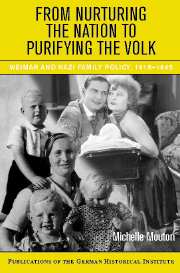Book contents
- Frontmatter
- Contents
- Acknowledgments
- List of Abbreviations
- Introduction
- 1 Marriage Policy in Turmoil
- 2 Divorce
- 3 From Mother's Day to Forced Sterilization
- 4 Alleviating the Burdens of Motherhood
- 5 Maternal Morality versus Infant Mortality
- 6 Forming Families beyond Blood Ties
- 7 Conclusion
- Bibliography
- Index
4 - Alleviating the Burdens of Motherhood
Published online by Cambridge University Press: 05 January 2013
- Frontmatter
- Contents
- Acknowledgments
- List of Abbreviations
- Introduction
- 1 Marriage Policy in Turmoil
- 2 Divorce
- 3 From Mother's Day to Forced Sterilization
- 4 Alleviating the Burdens of Motherhood
- 5 Maternal Morality versus Infant Mortality
- 6 Forming Families beyond Blood Ties
- 7 Conclusion
- Bibliography
- Index
Summary
In 1940, when Frau Ludwig bore her fourth child, Uli, she was awarded the Honorary Cross for German Mothers. Shortly after her daughter's birth, a recent high school graduate was sent to her by the National Socialist Women's Organization (NSF) to help Frau Ludwig with housework and childcare and fulfill her own Pflichtjahr (Service Year) obligations. Frau Ludwig, who had heeded her mother's advice – “Hilde, don't put your children in a kindergarten! You have them only so long for yourself” – was grateful for another pair of hands to help with her older children (ages five, three, and two). The teenager remained with the family during the war and helped when the fifth and sixth Ludwig children were born.
Though she partook of some of the benefits the Nazi state extended to child-rich mothers, Frau Ludwig opted out of others: she attended no courses on mothering, never visited a recuperation home, and did not recall bringing any of her children to advice centers. And she did not otherwise recognize any state influence on her experience as a mother. Moreover, she categorically denied having had her children because the Nazis wanted large families, attributing her decision instead to a belief that “better situated people” needed to have big families for Germany's sake. Frau Ludwig told me that she fundamentally believed that mothering was a woman's private responsibility, but she did not turn away the help proffered to aid child-rich families.
- Type
- Chapter
- Information
- From Nurturing the Nation to Purifying the VolkWeimar and Nazi Family Policy, 1918–1945, pp. 153 - 196Publisher: Cambridge University PressPrint publication year: 2007
- 1
- Cited by



